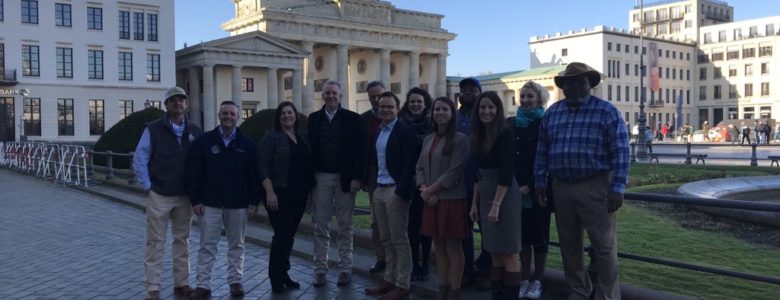Beth Oleson has worked for Association Services Group (ASG) for 17 years. A subject matter expert in food safety and agriculture, Beth found her home at ASG when one of the clients, the Georgia Fruit and Vegetable Growers Association (GFVGA), needed a Director of Food Safety.
“One of the main aspects of ASG that I love has been the ability to help, serve, teach, and partner with our members and sister organizations. It fills lots of my personal and professional buckets,” she said, reflecting on her time at ASG.
What is Leadership Mission on Agriculture Policy?
Recently, through her role with GFVGA and its’ connection to the Georgia Department of Agriculture, the GA Commissioner of Agriculture encouraged Beth to apply for the Leadership Mission on Agriculture Policy in Germany.
The event invites agriculture professionals from all industries to come to Germany, where the fellowship was hosted. For a week, Georgia agriculture industry members and advocates experienced the country, explored its government structure, and examined its approach to agriculture.
Attendees also learned about local and state financial support, where its resources come from, the challenges that German farmers face, and how they compare to the United States. “What might [Germany] have experienced that we haven’t yet, but should prepare for?” Beth said.
Differences Between US Agriculture and Germany Agriculture
Beth recalled the difference between the US agriculture industry and Germany’s. Experts on this trip said Germany is predicted to be food insecure. This means the country would not be able to produce enough food within its borders to feed its population when the European Union (EU) Green Deal goes into effect. The EU Green Deal requires countries that are part of the EU to cut their fertilizer and pesticide usage by 50% in a few years. This will result in a smaller crop, according to experts.
The goal of the Green Deal is to lessen the carbon footprint of agriculture. But in Germany’s case, this could create an issue where the country might minimize its carbon footprint in agriculture but maximize its carbon footprint via imports.
GMOs in Germany
Where Germany differs from America is in GMOs and energy. According to Beth, Germany cannot use genetically modified organisms (GMOs), per the EU’s Green Deal. In Germany, they’re called genetic engineering. The European country is also different because of the lack of natural resources to be an independent energy source. Because as of right now, Germany is almost 100% dependent on its neighboring countries for energy.
Beth explained that their solution is to rely on solar panels and wind turbines. Germany’s focus is on biomass, food waste, and feed waste into biodigesters so they can create methane for fuel generators that create electricity. “They do everything they can to create energy because they don’t have natural resources to create it. They are a country of resourceful people who don’t let many things go to waste.”
Similarities Between US Agriculture and Germany Agriculture
Despite these, Beth listed many similarities between agriculture in the U.S. and Germany. “We’re really not that different. They have labor issues just like we do in Georgia,” said Beth. She explained fresh fruits and vegetables are hand-picked, so it requires skilled hand labor. But that gets expensive in the U.S. and Germany. In the U.S., “you don’t just pay minimum wage, so you pay a higher rate to do tedious, delicate hand harvesting,” said Beth.
But Germany does not have that option since their minimum wage is high at $13 per hour or 12 euros. Much of their fresh fruit and vegetable industry has moved to Romania. A country that has lower hourly wages and an available labor force. Their only option is to import food and have manual labor supplied through a harvest outside of the country.
Beth also went on to explain that both nations struggle with common agriculture and farming issues such as prices increasing, balancing supply and demand, and forecasting needs. And lastly, managing relationships between buyers, retailers, wholesalers, and growers and suppliers. “They have the same ‘rock’ and ‘hard place’ as Georgia producers. Producers feel like they are ‘price takers’ and have very little power to move into the role of ‘price makers’.”
“We’re really not that different from each other,” she said.
Another similarity Beth discussed was the perception the public has of a small farm versus a large farm. Both countries struggle to find the balance and share the message that large farms are not the enemy. Beth stated, “In the U.S., large farms are usually family farms that started small.”
So, what were the lessons learned from this association management professional’s international ag tour: storytelling matters. “We need to make sure that from an agricultural perspective, we’re telling our story, the good story. There has to be a balance of the amazing things that are happening on our farm and how important food is to our national security.”


